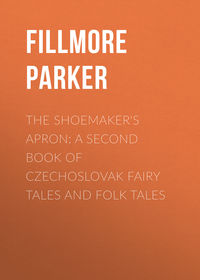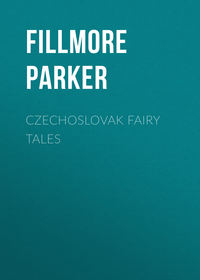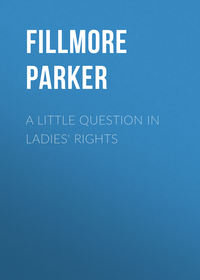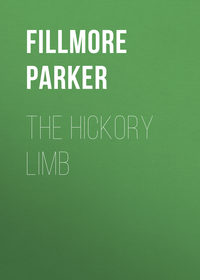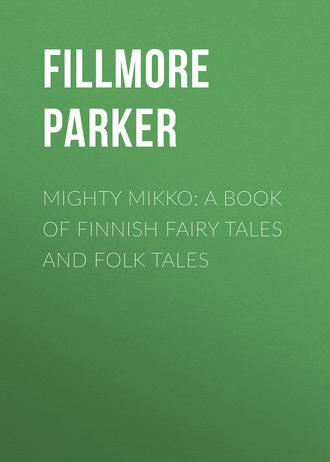 полная версия
полная версияMighty Mikko: A Book of Finnish Fairy Tales and Folk Tales
“She’s a good little mouse and I’m very fond of her,” Veikko thought to himself as he went out to the forest, “but my brothers will certainly laugh when they find she is only a mouse! Well, I don’t care if they do laugh! She’s been a good little sweetheart to me and I’m not going to be ashamed of her!”
So when he got to the hut he told the little mouse at once that his father wanted to see her.
The little mouse was greatly excited.
“I must go in proper style!” she said.
She rang the little silver bell and ordered her coach and five. The coach when it came turned out to be an empty nutshell and the five prancing steeds that were drawing it were five black mice. The little mouse seated herself in the coach with a coachman mouse on the box in front of her and a footman mouse on the box behind her.
“Oh, how my brothers will laugh!” thought Veikko.
But he didn’t laugh. He walked beside the coach and told the little mouse not to be frightened, that he would take good care of her. His father, he told her, was a gentle old man and would be kind to her.
When they left the forest they came to a river which was spanned by a foot bridge. Just as Veikko and the nutshell coach had reached the middle of the bridge, a man met them coming from the opposite direction.
“Mercy me!” the man exclaimed as he caught sight of the strange little coach that was rolling along beside Veikko. “What’s that?”
He stooped down and looked and then with a loud laugh he put out his foot and pushed the coach, the little mouse, her servants, and her five prancing steeds – all off the bridge and into the water below.
“What have you done! What have you done!” Veikko cried. “You’ve drowned my poor little sweetheart!”
The man thinking Veikko was crazy hurried away.
Veikko with tears in his eyes looked down into the water.
“You poor little mouse!” he said. “How sorry I am that you are drowned! You were a faithful loving sweetheart and now that you are gone I know how much I loved you!”
As he spoke he saw a beautiful coach of gold drawn by five glossy horses go up the far bank of the river. A coachman in gold lace held the reins and a footman in pointed cap sat up stiffly behind. The most beautiful girl in the world was seated in the coach. Her skin was as red as a berry and as white as snow, her long golden hair gleamed with jewels, and she was dressed in pearly velvet. She beckoned to Veikko and when he came close she said:
“Won’t you come sit beside me?”
“Me? Me?” Veikko stammered, too dazed to think.
The beautiful creature smiled.
“You were not ashamed to have me for a sweetheart when I was a mouse,” she said, “and surely now that I am a Princess again you won’t desert me!”
“A mouse!” Veikko gasped. “Were you the little mouse?”
The Princess nodded.
“Yes, I was the little mouse under an evil enchantment which could never have been broken if you had not taken me for a sweetheart and if another human being had not drowned me. Now the enchantment is broken forever. So come, we will go to your father and after he has given us his blessing we will get married and go home to my kingdom.”
And that’s exactly what they did. They drove at once to the farmer’s house and when Veikko’s father and his brothers and his brothers’ sweethearts saw the Princess’ coach stopping at their gate they all came out bowing and scraping to see what such grand folk could want of them.
“Father!” Veikko cried, “don’t you know me?”
The farmer stopped bowing long enough to look up.
“Why, bless my soul!” he cried, “it’s our Veikko!”
“Yes, father, I’m Veikko and this is the Princess that I’m going to marry!”
“A Princess, did you say, Veikko? Mercy me, where did my boy find a Princess?”
“Out in the forest where my tree pointed.”
“Well, well, well,” the farmer said, “where your tree pointed! I’ve always heard that was a good way to find a bride.”
The older brothers shook their heads gloomily and muttered:
“Just our luck! If only our trees had pointed to the forest we, too, should have found princesses instead of plain country wenches!”
But they were wrong: it wasn’t because his tree pointed to the forest that Veikko got the Princess, it was because he was so simple and good that he was kind even to a little mouse.
Well, after they had got the farmer’s blessing they rode home to the Princess’ kingdom and were married. And they were happy as they should have been for they were good and true to each other and they loved each other dearly.
THE ENCHANTED GROUSE
There was once an old couple who lived with their married son and his wife. The son’s name was Helli. He was a dutiful son but his wife was a scold. She was always finding fault with the old people and with her husband and for that matter with everybody else as well.
One morning when she saw her husband taking out his bow and arrows she said:
“Where are you going now?”
“I’m going hunting,” he told her.
“Isn’t that just like you!” she cried. “You’re going off to have a good time hunting and you don’t give a thought to me who have to stay home alone with two stupid old people!”
“If I didn’t go hunting,” Helli said, “and shoot something, we’d have nothing to put in the pot for dinner and then you would have reason to scold.”
At that the woman burst into tears.
“Of course, as usual blame me! Whatever happens it’s my fault!”
Poor Helli hurried off, hoping that by the time he returned his wife would be in a calmer state of mind. He had small success with his hunting. He shot arrow after arrow but always missed his mark. Then when he had only one arrow left he saw a Grouse standing in some brushwood so near that there was little likelihood of his missing it.
He took good aim but before he could fire the Grouse said:
“Don’t shoot me, brother! Take me home alive.”
Helli paused, then he shook his head.
“I’ve got to shoot you for we’ve nothing to put in the pot for dinner.”
Again he aimed his arrow and again the Grouse said:
“Don’t shoot me, brother! Take me home alive.”
For the second time Helli paused.
“I’d like to spare you,” he said, “but what would my wife say if I came home empty-handed?”
He took aim again and a third time the Grouse said:
“Don’t shoot me, brother! Take me home alive.”
At that Helli dropped his arrow.
“I don’t care what she says! I can’t shoot a creature that begs so pitifully for its life! Very well, Mr. Grouse, I’ll do as you say: I’ll take you home alive. But don’t blame me if my wife wrings your neck.”
He took the Grouse up in his arms and started homewards.
“Feed me for a year,” the Grouse said, “and I’ll reward you.”
When they reached home and Helli’s wife saw the Grouse, she cried out petulantly:
“Is that all you’ve got and out hunting all morning! That won’t be dinner enough for four!”
“This Grouse isn’t to be killed,” Helli announced. “I’m going to keep it for a year and feed it.”
“It won’t take much to feed a Grouse,” the old man remarked.
But the wife flew into a passion.
“What! Feed a useless bird when there isn’t enough to feed your own flesh and blood!”
But Helli was firm and despite her threats his wife did not dare to maltreat the Grouse.
At the end of a year the Grouse grew a copper feather in its tail which it dropped in the dooryard. Then it disappeared.
“Ha!” laughed Helli’s wife. “A copper feather! That’s your reward for feeding that thankless bird a whole year! And now it’s escaped!”
But the next day the Grouse returned.
“Feed me for another year,” it said to Helli, “and I’ll reward you.”
His wife raised an awful to-do over this, but Helli was firm and for another year he fed and petted the Grouse.
At the end of the second year the Grouse grew a silver feather in its tail which it dropped in the dooryard. Then it disappeared.
“One silver feather!” Helli’s wife cried. “So that’s all you get for feeding that thankless bird a whole year! And now it’s escaped!”
But it hadn’t. It returned the very next day.
“Feed me for another year,” it said to Helli, “and I’ll reward you.”
At the end of the third year the Grouse grew a golden feather in its tail and when it dropped that in the dooryard the scolding wife hadn’t so much to say, for a golden feather was after all pretty good pay for a few handfuls of grain.
For a day the Grouse disappeared and then when it returned it said to Helli:
“Get on my back and I’ll reward you.”
Helli did so and the Grouse, rising high in the air, flew far away. On, on it flew until it reached the broad Ocean. Over the Ocean it flew until Helli could see nothing but water in whatever direction he looked.
“Ha!” he said to himself with a shudder, “I hope I can hold on!”
As he spoke, the Grouse slipped from beneath him and he fell down, down, down. However, before he touched water the Grouse swooped under him and caught him up again high into the air. He had this same terrible experience a second time and a third time and each time he thought his last moment had arrived.
“Now,” the Grouse told him, “you know what my feelings were when you threatened three times to shoot me with your arrow.”
“You have taught me a lesson,” Helli said.
After that the Grouse flew on and on. At last it said:
“Look straight ahead, master, and tell me what you see.”
Helli shaded his eyes and looked.
“Far, far ahead I see what looks like a copper column.”
“Good!” the Grouse said. “That is the home of my oldest sister. She will be overjoyed to see us and when she hears how you have spared my life she will want to make you a present and will offer you various things. Take my advice and tell her that the only thing you want is her little locked box the key to which is lost. If she won’t give you that, accept nothing.”
The Grouse’s oldest sister received them most hospitably and when she had heard their story at once offered Helli anything he might like from among her treasures.
“Then give me your little locked box the key to which is lost,” Helli said.
The oldest sister shook her head.
“My little locked box! Who told you about that? I’m sorry, but I cannot give you that! Take anything else!”
“No,” Helli said, “that or nothing!”
When the oldest sister could not be prevailed upon to give away her little locked box, the Grouse had Helli mount his back once more and off they flew.
“We’ll visit my second sister now,” he said. “If she offers you a present, ask her for her little locked box without a key and accept nothing else.”
On, on they flew until the oldest sister’s castle was far behind.
“Look, master,” the Grouse said, “look straight ahead and tell me what you see.”
Helli shaded his eyes and looked.
“Far ahead I see something that is like a silver cloud.”
“That,” said the Grouse, “is the silver castle of my second sister.”
At the silver castle the second sister received them with joy and when she heard who Helli was at once declared that she wanted to show him her gratitude by making him a gift.
“Ask from me what you will,” she said, “and you shall have it.”
But when he asked for her little locked box without a key, she cried out:
“No! No! Not that! Anything else!”
“But I don’t want anything else!” Helli said.
When the Grouse saw that his second sister was not to be parted from her little locked box, he bade Helli mount his back and off they flew again.
“We’ll go to my youngest sister this time,” he said. “If she offers you a present, ask for the same thing.”
On, on they flew until the silver castle was lost to view.
“Now, master, look ahead and tell me what you see.”
Helli shaded his eyes and looked.
“I seem to see a golden haze like the sun behind a cloud.”
“That is the golden castle of my youngest sister.”
They arrived and the youngest sister threw her arms about the Grouse for she loved him dearly and had not seen him for a long time.
“Welcome, brother!” she said. “And welcome also to you, Helli!”
Then she offered Helli a present and when he asked for her little locked box without a key she gave it to him at once.
“It is my most precious possession,” she said, “but you may have it for you spared my dear brother’s life when you might have taken it.”
After they had rested and feasted they bade the youngest sister farewell and Helli with his precious box held tightly in one hand mounted the Grouse’s back and off they flew towards home.
“Be careful of the box,” the Grouse said, “and don’t let it out of your hands until we reach some beautiful spot where you’d like always to live.”
They passed high mountains and wooded lakes and fertile valleys.
“Shall we stop here?” the Grouse asked. “Or here? Or here?”
But always Helli said:
“No, not here.”
At last they reached home and the Grouse told Helli that now they must part forever.
“By sparing my life three times,” the Grouse said, “and then feeding me for three years you have broken the enchantment that bound me and now I shall not have to go about any longer as a grouse but shall be able to resume my natural shape. Farewell, Helli, and when you find the spot where you think you would like always to live, drop the box and you will find you have a treasure that will more than reward you for your kindness to me.”
The Grouse disappeared and Helli said to himself:
“Where do I want to live always but right here at home with my dear old father and mother and my wife who is my wife even if she does scold me sometimes!”
So there at home after they all had supper together, he dropped the box on the floor. It broke and out of it arose a beautiful castle with servants and riches and everything that Helli had always wanted and never had. And Helli and his old father and mother and his wife lived in it and were happy. And gradually his wife got over her habit of scolding for when you’re happy you haven’t anything to scold about.
THE TERRIBLE OLLI
There was once a wicked rich old Troll who lived on a Mountain that sloped down to a Bay. A decent Finn, a farmer, lived on the opposite side of the Bay. The farmer had three sons. When the boys had reached manhood he said to them one day:
“I should think it would shame you three strong youths that that wicked old Troll over there should live on year after year and no one trouble him. We work hard like honest Finns and are as poor at the end of the year as at the beginning. That old Troll with all his wickedness grows richer and richer. I tell you, if you boys had any real spirit you’d take his riches from him and drive him away!”
His youngest son, whose name was Olli, at once cried out:
“Very well, father, I will!”
But the two older sons, offended at Olli’s promptness, declared:
“You’ll do no such thing! Don’t forget your place in the family! You’re the youngest and we’re not going to let you push us aside. Now, father, we two will go across the Bay and rout out that old Troll. Olli may come with us if he likes and watch us while we do it.”
Olli laughed and said: “All right!” for he was used to his brothers treating him like a baby.
So in a few days the three brothers walked around the Bay and up the Mountain and presented themselves at the Troll’s house. The Troll and his old wife were both at home. They received the brothers with great civility.
“You’re the sons of the Finn who lives across the Bay, aren’t you?” the Troll said. “I’ve watched you boys grow up. I am certainly glad to see you for I have three daughters who need husbands. Marry my daughters and you’ll inherit my riches.”
The old Troll made this offer in order to get the young men into his power.
“Be careful!” Olli whispered.
But the brothers were too delighted at the prospect of inheriting the Troll’s riches so easily to pay any heed to Olli’s warning. Instead they accepted the Troll’s offer at once.
Well, the old Troll’s wife made them a fine supper and after supper the Troll sent them to bed with his three daughters. But first he put red caps on the three youths and white caps on the three Troll girls. He made a joke about the caps.
“A red cap and a white cap in each bed!” he said.
The older brothers suspected nothing and soon fell asleep. Olli, too, pretended to fall asleep and when he was sure that none of the Troll girls were still awake he got up and quietly changed the caps. He put the white caps on himself and his brothers and the red caps on the Troll girls. Then he crept back to bed and waited.
Presently the old Troll came over to the beds with a long knife in his hand. There was so little light in the room that he couldn’t see the faces of the sleepers, but it was easy enough to distinguish the white caps from the red caps. With three swift blows he cut off the heads under the red caps, thinking of course they were the heads of the three Finnish youths. Then he went back to bed with the old Troll wife and Olli could hear them both chuckling and laughing. After a time they went soundly to sleep as Olli could tell from their deep regular breathing and their loud snores.
Olli now roused his brothers and told them what had happened and the three of them slipped quietly out of the Troll house and hurried home to their father on the other side of the Bay.
After that the older brothers no longer talked of despoiling the Troll. They didn’t care to try another encounter with him.
“He might have cut our heads off!” they said, shuddering to think of the awful risk they had run.
Olli laughed at them.
“Come on!” he kept saying to them day after day. “Let’s go across the Bay to the Troll’s!”
“We’ll do no such thing!” they told him. “And you wouldn’t suggest it either if you weren’t so young and foolish!”
“Well,” Olli announced at last, “if you won’t come with me I’m going alone. I’ve heard that the Troll has a horse with hairs of gold and silver. I’ve decided I want that horse.”
“Olli,” his father said, “I don’t believe you ought to go. You know what your brothers say. That old Troll is an awfully sly one!”
But Olli only laughed.
“Good-by!” he called back as he waved his hand. “When you see me again I’ll be riding the Troll’s horse!”
The Troll wasn’t at home but the old Troll wife was there. When she saw Olli she thought to herself:
“Mercy me, here’s that Finnish boy again, the one that changed the caps! What shall I do? I must keep him here on some pretext or other until the Troll comes home!”
So she pretended to be very glad to see him.
“Why, Olli,” she said, “is that you? Come right in!”
She talked to him as long as she could and when she could think of nothing more to say she asked him would he take the horse and water it at the Lake.
“That will keep him busy,” she thought to herself, “and long before he gets back from the Lake the Troll will be here.”
But Olli, instead of leading the horse down to the Lake, jumped on its back and galloped away. By the time the Troll reached home, he was safely on the other side of the Bay.
When the Troll heard from the old Troll wife what had happened, he went down to the shore and hallooed across the Bay:
“Olli! Oh, Olli, are you there?”
Olli made a trumpet of his hands and called back:
“Yes, I’m here! What do you want?”
“Olli, have you got my horse?”
“Yes, I’ve got your horse but it’s my horse now!”
“Olli! Olli!” his father cried. “You mustn’t talk that way to the Troll! You’ll make him angry!”
And his brothers looking with envy at the horse with gold and silver hairs warned him sourly:
“You better be careful, young man, or the Troll will get you yet!”
A few days later Olli announced:
“I think I’ll go over and get the Troll’s money-bag.”
His father tried to dissuade him.
“Don’t be foolhardy, Olli! Your brothers say you had better not go to the Troll’s house again.”
But Olli only laughed and started gaily off as though he hadn’t a fear in the world.
Again he found the old Troll wife alone.
“Mercy me!” she thought to herself as she saw him coming, “here is that terrible Olli again! Whatever shall I do? I mustn’t let him off this time before the Troll gets back! I must keep him right here with me in the house.”
So when he came in she pretended that she was tired and that her back ached and she asked him would he watch the bread in the oven while she rested a few moments on the bed.
“Certainly I will,” Olli said.
So the old Troll wife lay down on the bed and Olli sat quietly in front of the oven. The Troll wife really was tired and before she knew it she fell asleep.
“Ha!” thought Olli, “here’s my chance!”
Without disturbing the Troll wife he reached under the bed, pulled out the big money-bag full of silver pieces, threw it over his shoulder, and hurried home.
He was measuring the money when he heard the Troll hallooing across to him:
“Olli! Oh, Olli, are you there?”
“Yes,” Olli shouted back, “I’m here! What do you want?”
“Olli, have you got my money-bag?”
“Yes, I’ve got your money-bag but it’s my money-bag now!”
A few days later Olli said:
“Do you know, the Troll has a beautiful coverlet woven of silk and gold. I think I’ll go over and get it.”
His father as usual protested but Olli laughed at him merrily and went. He took with him an auger and a can of water. He hid until it was dark, then climbed the roof of the Troll’s house and bored a hole right over the bed. When the Troll and his wife went to sleep he sprinkled some water on the coverlet and on their faces.
The Troll woke with a start.
“I’m wet!” he said, “and the bed’s wet, too!”
The old Troll wife got up to change the covers.
“The roof must be leaking,” she said. “It never leaked before. I suppose it was that last wind.”
She threw the wet coverlet up over the rafters to dry and put other covers on the bed.
When she and the Troll were again asleep, Olli made the hole a little bigger, reached in his hand, and got the coverlet from the rafters.
The next morning the Troll hallooed across the Bay:
“Olli! Oh, Olli, are you there?”
“Yes,” Olli shouted back, “I’m here! What do you want?”
“Have you got my coverlet woven of silk and gold?”
“Yes,” Olli told him, “I’ve got your coverlet but it’s my coverlet now!”
A few days later Olli said:
“There’s still one thing in the Troll’s house that I think I ought to get. It’s a golden bell. If I get that golden bell then there will be nothing left that had better belong to an honest Finn.”
So he went again to the Troll’s house taking with him a saw and an auger. He hid until night and, when the Troll and his wife were asleep, he cut a hole through the side of the house through which he reached in his hand to get the bell. At the touch of his hand the bell tinkled and woke the Troll. The Troll jumped out of bed and grabbed Olli’s hand.
“Ha! Ha!” he cried. “I’ve got you now and this time you won’t get away!”
Olli didn’t try to get away. He made no resistance while the Troll dragged him into the house.
“We’ll eat him – that’s what we’ll do!” the Troll said to his wife. “Heat the oven at once and we’ll roast him!”
So the Troll wife built a roaring fire in the oven.
“He’ll make a fine roast!” the Troll said, pinching Olli’s arms and legs. “I think we ought to invite the other Troll folk to come and help us eat him up. Suppose I just go over the Mountain and gather them in. You can manage here without me. As soon as the oven is well heated just take Olli and slip him in and close the door and by the time we come he’ll be done.”
“Very well,” the Troll wife said, “but don’t be too long! He’s young and tender and will roast quickly!”
So the Troll went out to invite to the feast the Troll folk who lived on the other side of the Mountain and Olli was left alone with the Troll wife.
When the oven was well heated she raked out the coals and said to Olli:
“Now then, my boy, sit down in front of the oven with your back to the opening and I’ll push you in nicely.”
Olli pretended he didn’t quite understand. He sat down first one way and then another, spreading himself out so large that he was too big for the oven door.
“Not that way!” the Troll wife kept saying. “Hunch up little, straight in front of the door!”


